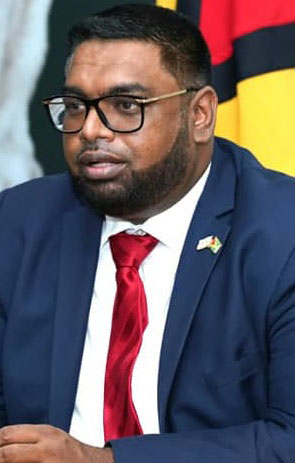President Irfaan Ali yesterday promised the private sector that his government will be responsive to their concerns and inclusive of their ideas. He further promised a reduction in the cost of energy by 60% over the next three years and a revision of legislation to reduce the time for the granting of a construction permit to three months.
“The opportunity that lies ahead for Guyana gives us an opening for a new approach, a results-driven approach to private sector advancement and development,” he explained during the 28th Annual General Meeting of the Private Sector Commission (PSC).
The AGM which was held virtually was attended by approximately 50 representatives of the private sector and diplomatic community.
Ali, who delivered the feature address promised them a transformative agenda which will include incentives for investment in health, education, environmental services, manufacturing, tourism, processing, livestock, agriculture, technology, financial services and infrastructure.
Stressing that development especially in the next three years will be approached via public-private partnerships, Ali promised that Government will facilitate a more robust private sector that brings new investment, expands production and increases exports, increases competitiveness and stimulates innovation.
As part of this facilitation there will be legislative and institutional change to create a single window approval system for building permits as well as a reduction of the time for a construction permit to three months.
One specific area that he mentioned will be explored are the lands which formally comprised the Wales Sugar Estate. According to Ali his government is moving for a Wales Development Authority to determine the key infrastructure needed to make that area a business incubation centre to support the small farmers.
Additionally, he promised a 60% reduction in energy costs over those same three years through the resurrection of the Amaila Falls Hydropower Project, the development of a natural gas facility and an alternative energy programme for hinterland and riverain communities.
“We must have a net surplus of energy to develop a manufacturing and processing sector,” Ali said.
He also noted that his government has already approached the government of India for a US$100 million loan to start work in the hinterland.
Further, after pointing out that Guyana’s existing wharf facilities will soon be unable to efficiently process the volume of traffic coming into the country, Ali mentioned that efforts are being made to plan and zone waterfront development.
“I have asked the Minister to secure the services of international experts to come here in a timely manner to work with government and the private sector on a waterfront development, wharf facility development and zoning development for Guyana,” he explained.
According to Ali, his government will be looking to the private sector to assist in ironing out issues of access to markets in the Caribbean Community (CARICOM).
Specific mention was made of the fact that the Trinidadian private sector is operating heavily in Guyana and he stressed that they should be called upon to lobby against the bureaucracy which is preventing Guyanese access to the Trinidadian market.
Most importantly Ali promised a clearly defined development trajectory which will allow the private sector to plan their investments and projects.
You can’t plan if you don’t know where gas will land, you can’t plan if you don’t know where the new agriculture frontier…is new growth poles [will be announced] so that strategic planning can be done,” he stressed adding that his government is also exploring avenues to secure capital for development.
There is room, he noted for mortgage banks with a capacity to lend to the private sector at lower rates and Government will be tendering for firms and individuals to seek on the international markets low- cost capital for government. The first of these ventures will be seeking US$200 million for housing development.





